I will tell you about the Ukrainian flag today
Yaroslava

When did the story begin?
The blue and yellow flag appeared in the mid-19th century.
From 1848 to 1849, the world experienced the Spring of Nations, the largest wave of revolutions in human history. These revolutions almost simultaneously swept through Europe. At that time, Europe was dominated by large empires, but the people living in these empires felt empowered and demanded greater political freedoms.
At that time, Ukraine's territory was divided between two empires: the russian Empire in the east and the Austrian Empire in the west. The Ukrainians from Galicia, Bukovyna, and Transcarpathia, part of the Austrian Empire, participated in the Spring of Nations in 1848 and initiated the Ukrainian Revolution.
On May 2, 1848, the leaders of revolutionary Western Ukraine, including representatives of the clergy, scholars, teachers, and historians, led by Bishop Hryhoriy Yakhymovych, established the Supreme Ruthenian Council in Lviv, which served as the revolution's decision-making centre.
At the same time, revolutionary centres began to emerge in the towns and villages of Western Ukraine. One of these centres asked the Supreme Ruthenian Council about the Ukrainian national colours and symbols.
After some consideration, the answer was a golden lion leaning on a rock on a blue background.
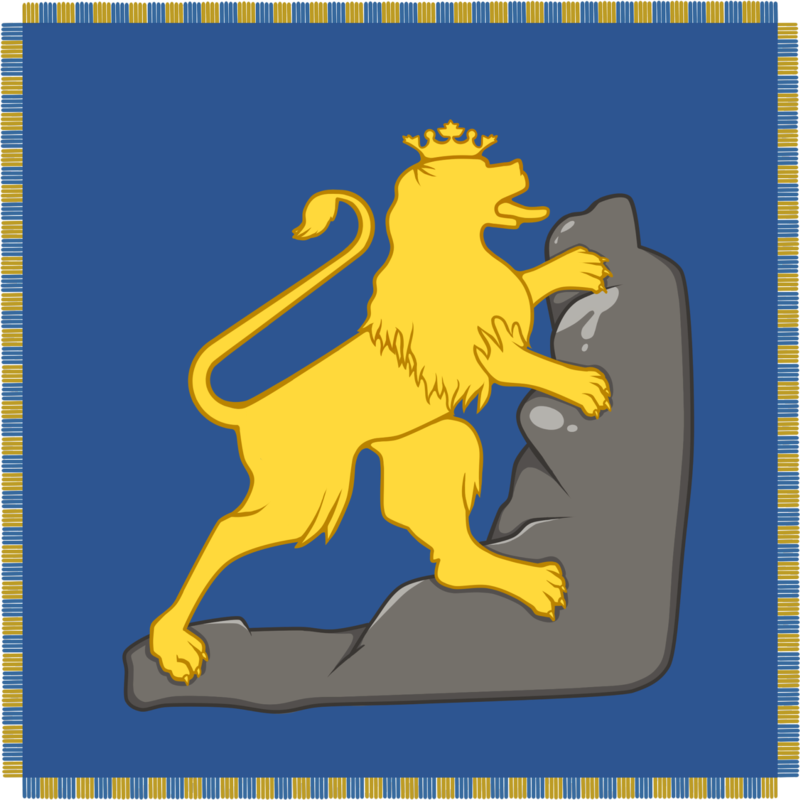
Why did they choose a symbol like that?
Let's go back to the 13th century when the Kingdom of Galicia–Volhynia, also known as the Kingdom of Ruthenia, existed in Ukrainian lands. It was the main state that emerged in modern Ukraine's territory after Kyivan Rus's collapse.
In 1253, Pope Innocent IV appointed Prince Danylo Romanovych as the king of the Kingdom of Galicia–Volhynia. The new king needed royal symbols. Considering that he founded the city of Lviv, known as the city of the lion, and named his son Lev (Lion), it is evident that the symbol of the lion held a sacred meaning for the king. So, the royal symbol appeared to be a golden lion on a blue background.
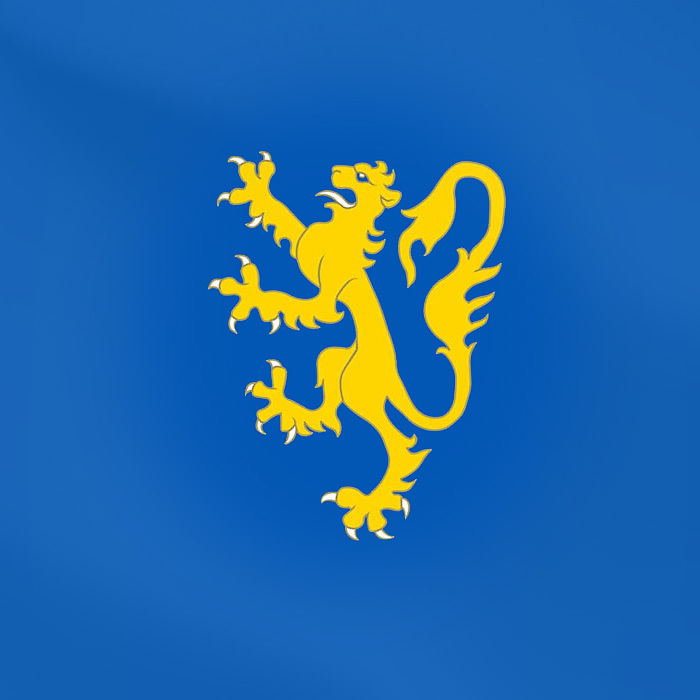
But when did the lion disappear from the Ukrainian flag?
Thus, on May 16, 1848, the Supreme Ruthenian Council decided to use the ancient coat of arms of the Kingdom of Galicia–Volhynia. The problem was that rural communities in Galicia constantly asked the Council to help them make local flags. The production of flags with a lion was complicated and expensive, so flags that were simplified to two horizontal stripes, blue and yellow, became more popular.
The blue and yellow flag was first flown over Lviv City Hall on June 25, 1848. Since then, it has been used at public events and demonstrations.
How did the blue and yellow flags spread across all the territory of Ukraine?
At the end of the 19th century, Ukrainians in the russian Empire were also interested in their traditions; national literature and theatre were developing. The russian authorities, who had been russifying the Ukrainian population for centuries, did not like this. In 1863, the Valuev Circular was issued, prohibiting the publication of religious and educational books in Ukrainian. The Ems Ukaz followed it in 1876, ousted the Ukrainian language from the public space (banning the use of the Ukrainian language in print except for reprinting old documents).
After the revolution in the empire in 1905-1907, the Valuev Circular was cancelled. This contributed to the discussion between Ukrainians living in the Austro-Hungarian Empire and the russian Empire about national symbols. The debate unfolded on the pages of newspapers.
The lion symbol was seen as unfamiliar by Ukrainians living in the russian Empire because russia had suppressed the true history of King Danylo for many years. However, using blue and yellow on the flag brought unity, as these colours reminded people of the wheat fields and blue sky of Ukraine.
What happened next?
In 1917, the russian Empire collapsed. On March 17, the Central Rada, a parliament of pro-Ukrainian forces fighting for independence, was formed in Kyiv. Historian and public figure Mykhailo Hrushevsky became its chairman. Under his leadership, on April 1, 1917, the first mass Ukrainian celebration of freedom occurred in front of St. Sophia Cathedral. It was a large demonstration with one hundred thousand people under blue and yellow flags.
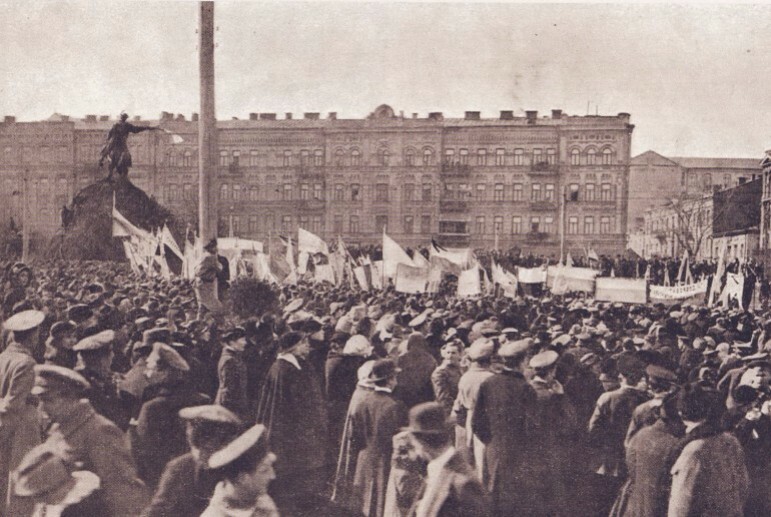
The Austro-Hungarian Empire was also under the threat of collapse. Ukrainians in the western lands of Ukraine also organized demonstrations in favour of forming the Western Ukrainian Republic. And they, too, came out with blue and yellow flags.
A joint flag symbolizing the desire for independence united the two parts of Ukraine on January 22, 1919, during a gathering of thousands of people on St. Sophia Square in Kyiv. The Unification Act was then proclaimed.
And what was the story of the Ukrainian flag in the Soviet Union?
After the collapse of the russian Empire, bolsheviks took over the territory and established their communist empire, the Soviet Union. During their rule over Ukrainian lands, the Communists suppressed the national movement and the display of the Ukrainian flag. Possession of the Ukrainian flag was punishable under two articles of the Criminal Code, known as "Anti-Soviet agitation and propaganda," and carried a penalty of imprisonment for six months to 7 years.
The Communists approved a red flag with a hammer, sickle, and star as the national flag of Soviet Ukraine, to which an azure stripe was added in the lower part in 1949.
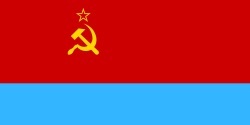
On May 1, 1966, a sensational event occurred in Kyiv. A blue and yellow flag replaced the red one over the Kyiv Institute of National Economy. The individuals responsible for this act were an electric welder and a plumber. They raised the blue and yellow flag as a protest against the violation of Ukrainians' rights and freedoms. As a result, they were sentenced to 2 and 3 years in prison, which they served in russian strict regime camps.
When did the blue and yellow flag return to Ukraine?
A year before the declaration of Independence on July 24, 1990, 200,000 Ukrainians gathered near the Kyiv City Council on Khreshchatyk. They came to the lawmakers with one question: When would they officially recognize the blue and yellow flag and take down the red Soviet flag? However, the communists did not want to do this. They left the session room through the back door to create an artificial lack of quorum, making it impossible to vote for the recognition of the Ukrainian flag.
Afterwards, people began taking action independently. A flag, blessed by the head of the Ukrainian Orthodox Church, Volodymyr, was brought from Lviv. At precisely 7 pm, the blue and yellow flag was raised over Kyiv while the Ukrainian anthem was sung. People were not even afraid of snipers positioned on the roofs of buildings by Soviet security forces. However, the communist authorities did not acknowledge the flag. For several months, residents of Kyiv guarded the flag on Khreshchatyk day and night until they eventually compelled the Kyiv City Council to vote for it.
On August 24, 1991, following the adoption of the Declaration of Independence, lawmakers brought a blue and yellow flag, which measured eight by four meters, into the session hall and covered the rostrum.
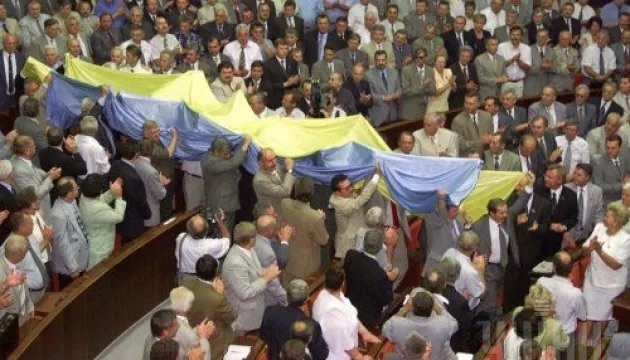
This is the story. I wrote it with tears and pride. With tears for all the terror we received (and still receive) from russia, and with pride for our invincible spirit.
We returned our blue and yellow flags. We gained our independence. And we will never give them back.
Слава Україні! Glory to Ukraine!
Sincerely,
Yaroslava
P.S. If you like this letter, please consider subscribing to them by joining my Patreon family. Thank you!





